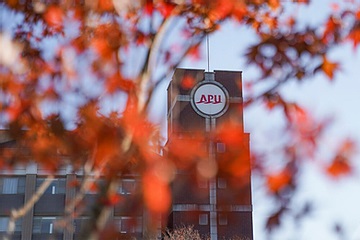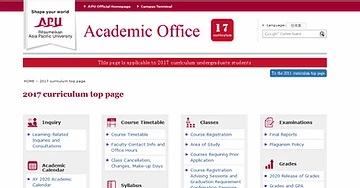Hello everyone. My name is Moyu Araki. I am a second-year student at the College of Asia Pacific Studies (APS). Allow me to first of all congratulate you on your admission to APU. On this occasion, I will provide an overview of the online classes offered at APU along with some pointers on how to make the most of such classes. My hope is that this will alleviate some of the concerns you may have about taking your first online classes. I also include a message for everyone at the end.
What you need for online classes
To participate in online classes, you will need an internet connection, a computer, and a camera (the latter is only necessary if you do not have a built-in camera in your computer). Any camera, even one with a low resolution, will do. While you can also use Zoom on a smartphone, the drawback is that PowerPoint presentations shared during classes will be difficult to read because you are viewing them on a small screen. In addition, you will need to prepare textbooks or other books for certain classes.
Online classes at APU
Because I have only taken APS subjects since the university started offering online classes, the overview below applies specifically to APS classes. The classes were held through Zoom, and some of them included groupwork based on Zoom’s breakout room function. For example, in the “Introduction to Media Studies” subject, the second half of each class used the breakout room function to exchange opinions about the class. In face-to-face classes, I often exchange opinions either with the students sitting around me or with friends. As a result, much of my groupwork time in such classes is spent with the same people. When taking online classes, however, Zoom randomly assigns class participants to breakout rooms, so I got to make new discoveries in every class. In addition, because students can no longer gather in the same location to take exams as before, we took exams at home. For example, in the “Language and Society” subject that I attended, we were instructed to take exams at a predesignated time, independently answer questions at the appointed time, and submit our responses through a designated website.
APU listens to student feedback and strives to rapidly improve its online classes. For example, in the “Introduction to Media Studies” subject, some students were unable to participate in classes due to a poor internet connection. To resolve this problem, the university subsequently published video recordings of the classes. From the fall semester, students who experience time lag or other internet connection troubles will also be permitted to take subjects based on video recordings.
Pointers to create a sense of immersiveness when taking online classes
I believe the main drawback of online classes is that you miss the sense of being immersed in a real class. As a result, students may adopt a passive attitude in class. I therefore recommend that you make an effort to create a sense of immersiveness. Below, I present three concrete methods to do this.
(1) Make an effort to ask at least one question per class.
APU lecturers politely respond to the questions of their students. Many lecturers also set aside time for questions on Zoom after each class. In other words, classes are set up in such a way as to make it easy for students to ask direct questions. Expressing your own opinions is certainly an effective way to enhance your interest in the topic being discussed, and stay concentrated during class. If you make a conscious effort to ask at least one question per class, you will be able to remain attentive during class. However, please be respectful when you ask questions to professors or lecturers.
(2) Discuss class topics with friends after classes.
APU brings together students with a variety of backgrounds, and every student has a different take on the topics covered in a class. Because online classes are attended simultaneously by students who live in various parts of the world, this opens up opportunities to exchange opinions with students who hold different viewpoints—even more so than in face-to-face classes. Some students may be concerned about whether they will be able to make friends. Actually, it is surprisingly easy to make friends in the breakout rooms I mentioned above, so there is nothing to worry about. Some time after I held a presentation in a “Social Psychology” class, I received the following message on my Facebook page: “I agree with the opinion you expressed the other day. Let’s be friends!”
(3) Using the knowledge gained from classes in real-life settings will encourage you to think about practical applications. Let me give you an example. I major in “Media,” and when I study about a new medium, I compare it with traditional media, and examine whether it can be combined with existing products to create interesting media. By making this a habit, you can transform class content into actual ideas, and this in turn will allow you to actively participate in classes.
To all students who are concerned about online classes
I hope this article has eased your concerns regarding online classes to some extent. If you have any further concerns about online classes at APU, please consult with the Academic Office, and one of the staff members will assist you. I wish you all an exciting journey as you pursue your studies at APU.
Academic office web site
Moyu Araki
Nice to meet you! I am a fourth year APS student who loves to try new things. I am 100% Japanese with no experience studying abroad by Japanese standards. I want to have academic conversations with my international student friends, so I'm taking advantage of quarantine to study English! Once things turn around, I'll be back on the road to various places~! Best regards.













